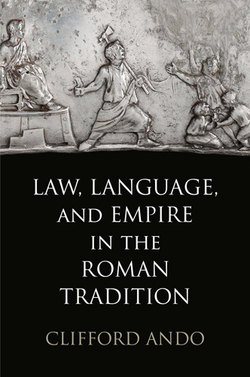Читать книгу Law, Language, and Empire in the Roman Tradition - Clifford Ando - Страница 8
На сайте Литреса книга снята с продажи.
ОглавлениеPreface
The civil law was an instrument of empire. It was not, or was not simply, as Roman legal philosophers claimed, a body of rules crafted through communal deliberation and approved by the citizen body for use strictly over itself. On the contrary, many of its most characteristic features—the substructure of formal mechanisms whereby innovation was accomplished in practice and justified in theory; its concern with philosophy of language and the apparatus by which that concern was given expression; its very historical selfconsciousness—developed in response to the challenges posed when the Latinate legal system of the single and singular polity of Rome was deployed so as to embrace, incorporate, and govern discrepant people and cultures far afield. This volume attempts to vindicate that position; it illustrates what seem to me significant contours of some, at least, of the problems it raises; and it invites conversation on its themes.
The argument falls into two parts. Chapters 1 and 2 sketch a history of the processes whereby lawyers at Rome, in statute and jurisprudence, grappled with the legal pluralism of the world imperial action had created. They are not narrowly an effort to describe practice. (I—and others—are taking up that challenge elsewhere.) Nor do I offer a history of positive law, of legal doctrine, on marriage or dowry or contract or some similar issue, from some antecedent moment when Roman law really was Roman to some late ancient date when it was not. I eschew that problem in part because histories of doctrine abound, and in part because what interests me are rather the means by which Roman lawyers naturalized such changes as did occur, such that civil-law doctrine of late antiquity on marriage, dowry, and contract could easily and legitimately be described as Roman, regardless of the source and nature of the changes it had undergone.
Chapters 3, 4, and 5 examine the relationship between civil, public, and international law in the Roman tradition. Though the latter two categories occupy positions of prestige in ancient and modern legal theory, neither was codified in antiquity. Partly in consequence, neither became the object of jurisprudential scrutiny; nor did either develop an autonomous tradition of argument or interpretation. On the contrary, in the ancient, medieval, and early modern Roman traditions, it was the civil law that provided conceptual resources to those others and whose actions proved paradeigmatic in the articulation of public and international law. At the same time, the manifold implications of the civil law in those systems of domination—its use as archetype in political and legal argument outside its own narrow sphere—opened the door to its own subversion. For when political turmoil at Rome upended its institutions of political and legislative authority and effectively ended its democracy, the concepts and language that the civil law supplied to the project of Republican empire saw their meanings transformed; and by metaphorical recursion, forms of imperial domination once exercised by Romans over others were inscribed in the workings of law at Rome, henceforth to be exercised by the Romans over themselves.
• • •
The focus of the volume overall is therefore not what the Romans thought but rather how they thought. It is at that level an archaeology of foundational concepts, conceptual archetypes, and modes of argument. Outside the work of Yan Thomas, this is not a topic that has received much attention from Roman legal historians. The reasons for this deserve some scrutiny. On the basis of currently available evidence, the Romans did not write treatises on legal argument or, for that matter, rules of evidence or precedence or procedure stricto sensu. Not even allusions to such survive. In consequence, the tendency of historians of law to accept and to function within the imaginative and discursive boundaries of the systems they study has issued, in the case of Roman law, in a remarkably narrow conception of intellectual history.
The second major ambition of the book, the one foregrounded above, is the investigation of the effects on the civil law of its implication in projects of empire. Again, my own concern is not with the vastly important questions, in what venues and in what forms the civil law was applied around the empire, or even how its content was known to subjects of Rome. My goal is rather to isolate and study the effects on legal philosophy and legal reasoning that arose from the civil law’s implication in those contexts. This again falls outside traditional forms of intellectual-historical inquiry practiced in the field.
To sketch in brief compass two proposals central to what follows, to understand the civil law as an instrument of empire and the product of an imperial state means first situating Roman civil law in all its jurisdictions alongside other codes of law; it requires us to view the Roman Empire, even Rome itself, as legally pluralist; it compels us to understand the operations of law in light of the discrepant legal statuses of the persons whose lives it regulated; and it demands that we recall the populations of the empire to have been linguistically, culturally, and in every other respect heterogenous.
Second, we need to remember that the civil law was at different times and in different ways called upon to codify and sustain systems of differential legal privilege: civil-law arguments were adduced to justify the acquisition of empire, even as civil-law actions were devised and deployed to consolidate its fruits.
This volume is also intended as a celebration of the astonishing creativity of the lawyers and jurists who wrote and reasoned the law at Rome. To read and think in their company is to encounter those ancients who grappled most sincerely and most extensively with the complexity and diversity of the world ancient political action had brought into being. What follows is often a critical reading, but throughout an appreciative one.
